I took up office in January 2020 in a role which is very close to my heart and in a sector that I have been involved in all my life.
I could not have imagined then the difficulties we would face as a sector. However, it is my intention to leave a positive impact for the better in the remaining time I have in this post.
COVID-19 has brought severe market uncertainty for many sectors, with a collapse in the food service sector and COVID-related impacts on critical third-country markets.
In response to the reduction in farmgate prices, I identified and targeted £25m to help support farmers, and I have also held some funding in reserve, in case there is an emerging need elsewhere in the coming months.
Huge challenges for society
COVID-19 presents huge challenges for people across society. However, I have witnessed a renewed positivity from people as to the role farmers and the wider agri food sector play in their lives.
Specifically, people see that throughout this pandemic, high-quality, local food continues to be on their tables.
We must capitalise on this momentum, building support for the industry and ensuring our products are the go-to choices on supermarket shelves.
I want to explore with ministerial colleagues how we can achieve this objective over the remainder of my mandate.
I also want to put in place a road map for this region to deliver resource efficiency, climate action, environmental improvement and sustainable economic and social growth through the green growth strategy and delivery framework.
Support
We need to support farmers to play their part in reducing emissions through greater R&D and capital investment. Reducing emissions ultimately leads to sustainable development. Agriculture and the environment can, and should, work in tandem.
COVID-19 has, unfortunately, taken our attention away from the day-to-day policy work that is so important for our agri-food industry. There are a number of key policy areas I want to focus on and deliver for farmers, one being the need for a support system which will help drive better productivity, environmental performance, resilience and improved supply chain integration.
Compliance
The current land-based system has let farmers down and has not driven the industry forward. Officials are reviewing how we can have a better approach to achieving compliance with scheme conditions, something which is long overdue.
Currently, the penalty in many cases is not proportionate and we must look at better ways to achieve the desired scheme outcomes. I have also begun to look at what I can do to help young farmers at the start of their career.
Bovine TB is an area where the government must do much more. We have yet to take on a strategy which helps to substantially reduce incidences of the disease across Northern Ireland (NI).
By working together, collaboratively, I intend to bring forward a new collaborative strategy in the coming months which builds upon evidence from across the British Isles. It will not be perfect, but perfection cannot be the enemy of progress.
In relation to the EU exit, I want to see a fair and transparent trade deal with the EU. The ongoing negotiations with the EU lack clarity and leave it difficult to plan. My main priority is to ensure unfettered access for NI goods going to Britain. This is by far our largest market and one which must be protected.
There are areas I will continue to work on with the Irish Minister for Agriculture to ensure NI farmers have access to EU and Irish markets, participate in PGIs where appropriate and maximise the marketing opportunities for our products.
There is no doubt that the next few months will bring huge challenges.
However, we must continue to seek out the opportunities, capitalise on them and remain adaptable. COVID-19 has shown us the importance of farmers and their resilience must be commended.






 This is a subscriber-only article
This is a subscriber-only article










SHARING OPTIONS: